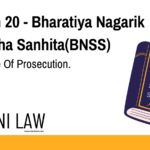Code:
(1) In conferring powers under this Sanhita, the High Court or the State Government, as the case may be, may, by order, empower persons specially by name or in virtue of their offices or classes of officials generally be their official titles.
(2) Every such order shall take effect from the date on which it is communicated to the person so empowered.
Explanation
This section of the Bharatiya Nagarik Suraksha Sanhita (BNSS) deals with the delegation of powers granted under the Sanhita. It states that the High Court or the State Government (depending on the context) can empower specific individuals or groups of officials to exercise certain powers provided in the BNSS.
- Empowering by name: The authority can directly name individuals who will possess specific powers.
- Empowering by office: Powers can be assigned to individuals based on their official position or role.
- Empowering by class of officials: The authority can delegate powers to entire groups of officials defined by their official title or function.
The order delegating these powers must be formally communicated to the person or group of officials being empowered. The powers granted become effective from the date of communication.
Illustration
Imagine a situation where the State Government wants to delegate the power to investigate minor traffic violations to certain police officers. They can use Section 26 of the BNSS to issue an order specifically naming those officers or empowering all officers of a particular rank to handle such cases. Once the order is communicated to the designated officers, they acquire the authority to carry out these investigations.
Common Questions and Answers
Q: Can the High Court or the State Government delegate all powers under the BNSS?
A: No. The BNSS might contain certain powers that cannot be delegated. These are typically powers that require the direct exercise of judgment or discretion by the High Court or the State Government.
Q: What are the consequences of acting without proper delegation of powers?
A: Any actions taken without proper authorization under Section 26 may be considered illegal, potentially leading to challenges in court.
Q: Can an order delegating powers be revoked?
A: Yes, the High Court or the State Government can revoke an order delegating powers, thus removing the authority of the empowered individuals or officials.







